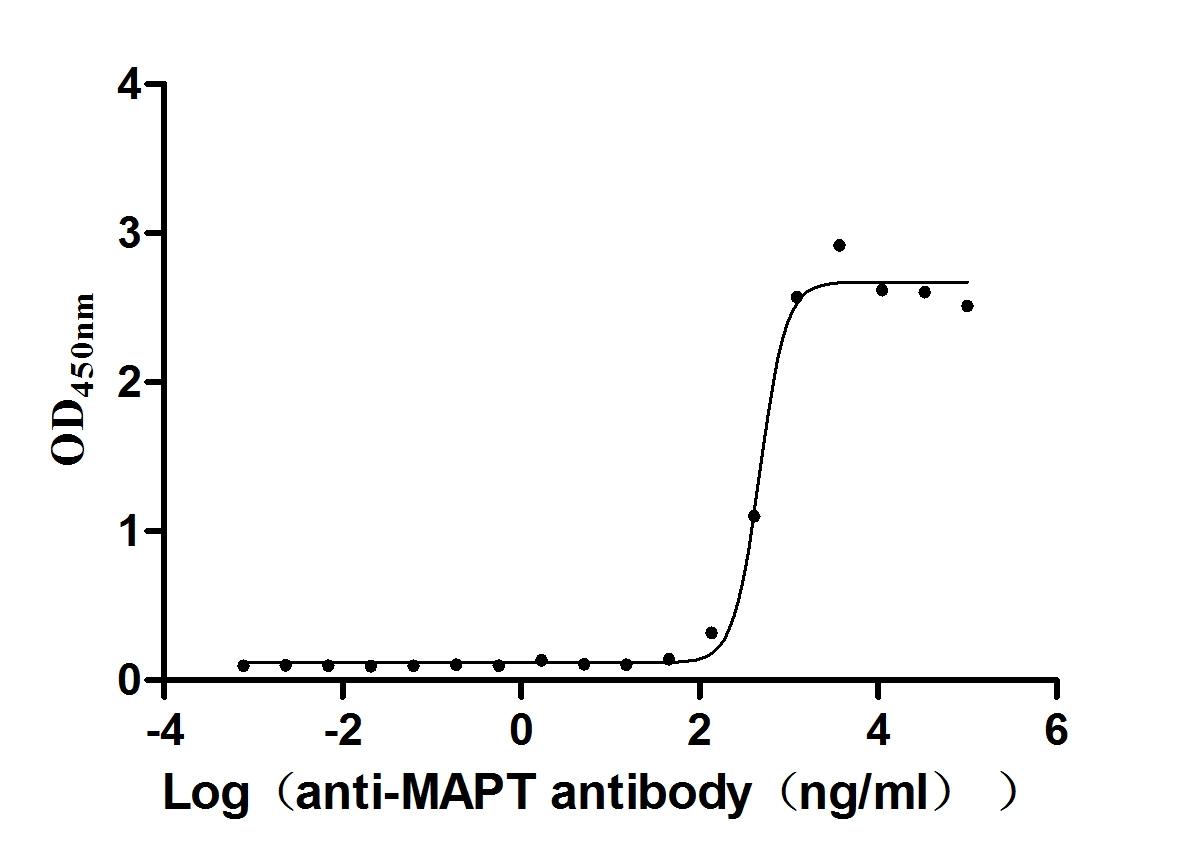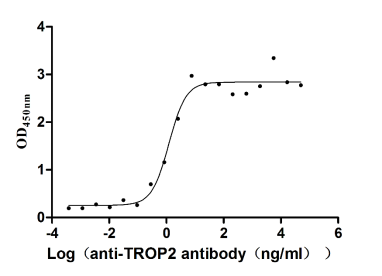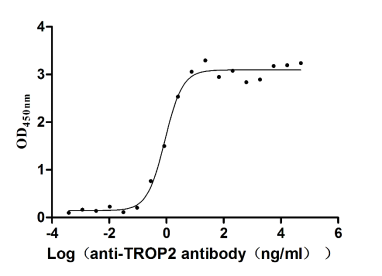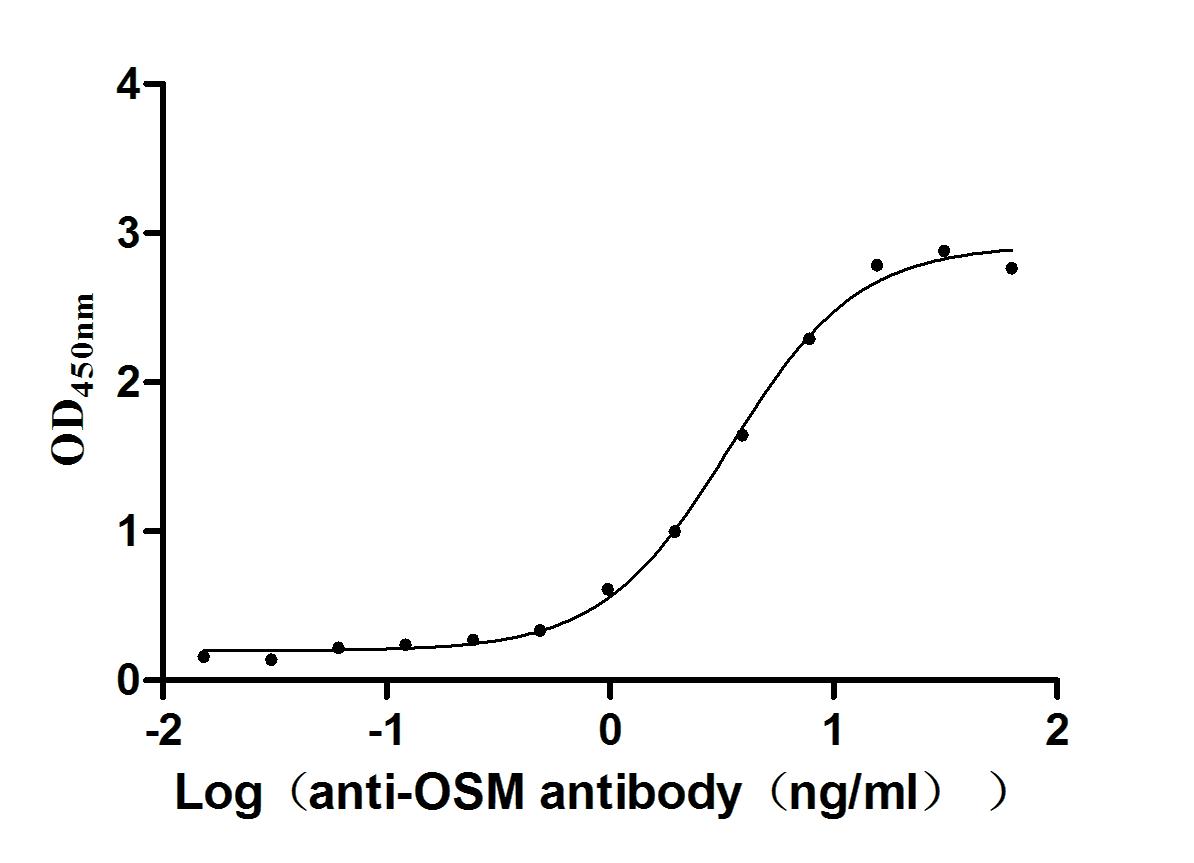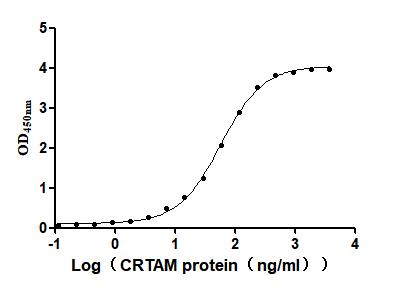Recombinant Mouse Desmoglein-3 (Dsg3), partial
-
货号:CSB-MP007205MO
-
规格:
-
来源:Mammalian cell
-
其他:
-
货号:CSB-EP007205MO-B
-
规格:
-
来源:E.coli
-
共轭:Avi-tag Biotinylated
E. coli biotin ligase (BirA) is highly specific in covalently attaching biotin to the 15 amino acid AviTag peptide. This recombinant protein was biotinylated in vivo by AviTag-BirA technology, which method is BriA catalyzes amide linkage between the biotin and the specific lysine of the AviTag.
-
其他:
产品详情
-
纯度:Greater than 85% as determined by SDS-PAGE.
-
基因名:Name:Dsg3
-
Uniprot No.:
-
别名:Dsg3Desmoglein-3; 130 kDa pemphigus vulgaris antigen homolog
-
种属:Mus musculus (Mouse)
-
蛋白长度:Partial
-
表达区域:50-617
-
氨基酸序列E WVKFAKPCRE REDNSRRNPI AKITSDFQKN QKITYRISGV GIDQPPFGIF VVDPNNGDIN ITAIVDREET PSFLITCRAL NALGQDVERP LILTVKILDV NDNPPIFSQT IFKGEIEENS ASNSLVMILN ATDADEPNHM NSKIAFKIVS QEPAGMSMFL ISRNTGEVRT LTSSLDREQI SSYHLVVSGA DNDGTGLSTQ CECSIKIKDV NDNFPVLRES QYSARIEENT LNAELLRFQV TDWDEEYTDN WLAVYFFTSG NEGNWFEIET DPRTNEGILK VVKALDYEQV QSMQFSIAVR NKAEFHQSVI SQYRVQSTPV TIQVIDVREG ISFRPPSKTF TVQRGVSTNK LVGYILGTYQ ATDEDTGKAA SSVRYVLGRN DGGLLVIDSK TAQIKFVKNI DRDSTFIVNK TISAEVLAID ENTGKTSTGT IYVEVPSFNE NCPSVVLEKK DICTSSPSVT LSVRTLDRGK YTGPYTVSLE EQPLKLPVMW TITTLNATSA LLQAQQQVSP GVYNVPVIVK DNQDGLCDTP ESLTLTVCQC DDRSMCRAPI PSREPNTYGE SSWRLGP
-
蛋白标签:Tag type will be determined during the manufacturing process.
The tag type will be determined during production process. If you have specified tag type, please tell us and we will develop the specified tag preferentially. -
产品提供形式:Lyophilized powder
Note: We will preferentially ship the format that we have in stock, however, if you have any special requirement for the format, please remark your requirement when placing the order, we will prepare according to your demand. -
复溶:We recommend that this vial be briefly centrifuged prior to opening to bring the contents to the bottom. Please reconstitute protein in deionized sterile water to a concentration of 0.1-1.0 mg/mL.We recommend to add 5-50% of glycerol (final concentration) and aliquot for long-term storage at -20℃/-80℃. Our default final concentration of glycerol is 50%. Customers could use it as reference.
-
储存条件:Store at -20°C/-80°C upon receipt, aliquoting is necessary for mutiple use. Avoid repeated freeze-thaw cycles.
-
保质期:The shelf life is related to many factors, storage state, buffer ingredients, storage temperature and the stability of the protein itself.
Generally, the shelf life of liquid form is 6 months at -20°C/-80°C. The shelf life of lyophilized form is 12 months at -20°C/-80°C. -
货期:Delivery time may differ from different purchasing way or location, please kindly consult your local distributors for specific delivery time.Note: All of our proteins are default shipped with normal blue ice packs, if you request to ship with dry ice, please communicate with us in advance and extra fees will be charged.
-
注意事项:Repeated freezing and thawing is not recommended. Store working aliquots at 4°C for up to one week.
-
Datasheet :Please contact us to get it.
相关产品
靶点详情
-
功能:Component of intercellular desmosome junctions. Involved in the interaction of plaque proteins and intermediate filaments mediating cell-cell adhesion.
-
基因功能参考文献:
- flotillin has a role in desmosomal adhesion and Pemphigus vulgaris-like localisation of desmoglein-3 in human keratinocytes PMID: 27346727
- Desmoglein 3 deficiency in mice leads to a phenotype characterized by cyclic alopecia in addition to the dramatic skin and mucocutaneous acantholysis observed in pemphigus patients. PMID: 25542773
- Dsg3, via p38 MAPK, regulates the spatial distribution of the keratin filament network and stabilizes cell adhesion. PMID: 24782306
- Squamous metaplasia after pulmonary epithelial injury may play a crucial role in redirecting the skin-specific autoimmune reaction to the lungs in paraneoplastic pemphigus (PNP). PMID: 23729442
- Dsg3 deficiency results in perturbation of the desmosomal network at the transcriptional, translational, and interaction level, kinase activation, proteinase-mediated degradation, and hyper-adhesion. (Review) PMID: 23368972
- Thus, Dsg3 does not display a clear function as a tumor suppressor in these mouse skin cancer models PMID: 23185521
- IgG and IgM antibodies against desmoglein 3 have a pathogenic role in blister formation in pemphigus vulgaris PMID: 21718682
- the adult passive transfer mouse model is ideally suited for detailed studies of Dsg3 antibody-mediated signaling in adult skin. PMID: 21956125
- These data indicate a contribution of Dsg depletion to pemphigus vulgaris pathogenesis dependent on Ca(2+)-induced differentiation. PMID: 21864491
- Aire has an important role in Dsg3 expression as well as in selection of T cells that help B cells to produce anti-Dsg3 IgG in thymus. PMID: 21048786
- Loss of tolerance against Dsg3 in both B and T cells is important for the development of autoimmune state of pemphigus vulgaris. PMID: 11857336
- Patchy hair loss in pemphigus vulgaris model mice as in Dsg3(-/-) mice. Ultrastructure of telogen hair follicles same as PV model mice and Dsg3(-/-) mice. Anti-Dsg3 autoantibodies interfere with cell-cell adhesion of keratinocytes in PV model mice. PMID: 12373337
- perturbation of desmoglein 3 found in the Dsg3bal-Pas mice resulted in disadhesion of keratinocytes manifested with blistering phenotype. PMID: 12485423
- anti-Dsg3 IgG antibodies can directly access Dsg3 present in desmosomes in vivo and cause the subsequent desmosome separation that leads to blister formation in pemphigus vulgaris PMID: 15140217
- In pemphigus vulgaris antibodies were dominantly raised against middle to C-terminal extracellular domains of mouse Dsg3 where amino acid sequences are less conserved among desmoglein isoforms. Those antibodies may also be involved in blister formation. PMID: 15265525
- importance of the companion layer, and particularly the Dsg1 and Dsg3 in this layer, in anchoring the anagen hair to the follicle. PMID: 15482466
- Northern Blot analysis of wild-type and Plucked (pk) mutant mice indicates that expression of both desmoglein 1 (Dsg1) and desmoglein 3 (Dsg3) is up-regulated in the skin of mutant pk mice PMID: 15629430
- skin-specific Dsg3 serves as an autoantigen in chronic skin inflammatory diseases accompanied by mast cell degranulation, including both murine systemic lupus erythematosus and other autoinflammatory diseases PMID: 16492738
- Reduction of Dsg3 might be relevant to blister formation in pemphigus vulgaris. PMID: 17431647
- distinct T cell responses could be switched after active immunization combined with different adjuvants, resulting in distinct anti-Dsg3 antibody isotypes with different pathogenic activities in Pemphigus disease development PMID: 18634826
- Subcellular localization of desmosomal components is different between desmoglein3 knockout mice and pemphigus vulgaris model mice. PMID: 19525093
显示更多
收起更多
-
亚细胞定位:Cell membrane; Single-pass type I membrane protein. Cell junction, desmosome.
-
组织特异性:Expressed in epidermis.
-
数据库链接:
KEGG: mmu:13512
STRING: 10090.ENSMUSP00000064718
UniGene: Mm.106811
Most popular with customers
-
Recombinant Human Glucagon receptor (GCGR), partial (Active)
Express system: Mammalian cell
Species: Homo sapiens (Human)
-
Recombinant Human T-cell surface protein tactile (CD96), partial (Active)
Express system: Mammalian cell
Species: Homo sapiens (Human)
-
Recombinant Human IGF-like family receptor 1 (IGFLR1), partial (Active)
Express system: Mammalian cell
Species: Homo sapiens (Human)
-
Recombinant Mouse Microtubule-associated protein tau (Mapt) (Active)
Express system: Mammalian cell
Species: Mus musculus (Mouse)
-
Recombinant Human Tumor-associated calcium signal transducer 2 (TACSTD2), partial (Active)
Express system: Mammalian cell
Species: Homo sapiens (Human)
-
Recombinant Human Tumor-associated calcium signal transducer 2 (TACSTD2), partial (Active)
Express system: Mammalian cell
Species: Homo sapiens (Human)
-
Recombinant Human Oncostatin-M (OSM), partial (Active)
Express system: Mammalian cell
Species: Homo sapiens (Human)
-
Recombinant Mouse Cytotoxic and regulatory T-cell molecule (Crtam), partial (Active)
Express system: Mammalian cell
Species: Mus musculus (Mouse)



-AC1.jpg)

